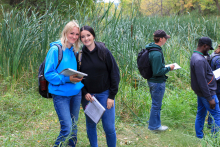ACC welcomes news of federal investment in post-secondary infrastructure
April 6, 2016
ACC is pleased to hear the federal government’s announcement made earlier today on the Post-Secondary Institutions Strategic Investment Fund (SIF).
“Knowledge infrastructure is critically important to growing the Canadian and Manitoba economies,” said ACC president Mark Frison. “With today’s announcement, we now have an additional avenue to pursue to support student growth, program expansion and applied research opportunities at our college.”
The SIF will contribute up to $2 billion over three years to support up to 50 per cent of eligible infrastructure project costs at post-secondary institutions, in collaboration with non-federal partners.
This past January, the Manitoba Government announced its support to contribute $66.7 million towards the college’s Centre for Health Energy and Environment (CHEE), a project estimated at $98.1 million. That project will redevelop the iconic 103-year-old Parkland Building at the college’s North Hill Campus in Brandon.
Once complete, CHEE will provide much-needed programming and student life space on campus.
“ACC is on track to double our number of graduates by 2025 in support of the province’s goal to add an additional 75,000 to the labour force by 2020,” said Frison. “Appropriate training space is vital to our growth. We can’t respond properly to labour market demand and the needs of industry if we lack the necessary facilities to offer new programs and promote innovation.”
Last year, ACC and the Province of Manitoba also submitted the CHEE proposal to the Government of Canada under the New Building Canada Fund: PTIC-NRP and remain optimistic that this program will make a contribution to the project.
The new SIF presents an opportunity to secure the resources needed to complete the CHEE project, complementing the existing provincial contribution and complementary federal programs.
A report released by Colleges and Institutes Canada (CICan) this past February noted that nearly two-thirds of its member institutions’ physical infrastructure had passed its useful life span. CICan members also identified a collective 200 new construction projects—worth an estimated $6 billion—as shovel-ready, but on hold until funding becomes available.



